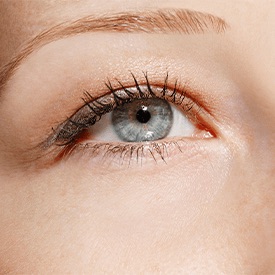Refractive Errors in Boca Raton, FL
What are Refractive Errors?
In a healthy human eye, light enters through the cornea or clear front window of the eye and the cornea refracts (bends) the light so that it passes through the pupil and then the eye’s natural crystalline lens. In an eye with perfect vision, the light rays focus on the retina and a clear picture is transmitted to the brain through the optic nerve. A refractive error, such as myopia (nearsightedness), hyperopia (farsightedness), astigmatism, or presbyopia (age-related farsightedness), happens when light is not bending and focusing on the back of the retina to produce a clear picture. Refractive errors are common and can affect patients of all ages.
What are the symptoms of refractive errors?
The symptoms of refractive errors may vary from person to person. However, a few common signs are associated with the condition. Before you contact our providers to receive treatment for refractive errors in Boca Raton, FL it’s important to know the symptoms. The symptoms may include the following:
- Hazy vision
- Headaches
- A halo or glare around bright lights
- Double vision
- Eye strain
- Squinting
- Trouble focusing when reading or looking at a computer
What Are the Causes of Refractive Errors?
A refractive error is caused by the inability of your eye to correctly reflect light. There are three causes of a refraction error. The first is a change in the shape of the eye. The second is a steep or flat surface of the eye. The third is when you have a thicker or thinner lens than is normal. It is a common error that has a variety of treatments.
What Are the Risk Factors for Refractive Errors?
Refractive errors, such as nearsightedness (myopia), farsightedness (hyperopia), and astigmatism, can occur due to a variety of factors. Genetics play a significant role, as these conditions often run in families. Environmental factors, such as spending a lot of time doing close-up work or reading in poor light, can also contribute. Age is another factor, as the shape and flexibility of the eye’s lens can change over time, leading to a higher risk of developing refractive errors, especially after the age of 40. Other risk factors include certain medical conditions, like diabetes, and the use of medications that can affect the eyes.
How are refractive errors diagnosed?
Refractive errors are often diagnosed during a routine eye exam. At our Boca Raton, FL eye center, we will perform a variety of tests, including having you read a vision chart and testing various lenses. This will allow us to determine the extent of your refractive error and prescribe a prescription.
How are refractive errors treated?
Refractive errors are often treated with corrective lenses, and Clewner & Kelly Eye Center offers a wide variety of contacts and glasses to suit your lifestyle, needs, and budget in our optical shop. For patients who desire to eliminate or reduce their dependence on corrective lenses, our full-service ophthalmology center offers refractive surgery to improve vision. Refractive surgeries correct refractive errors either by reshaping the cornea or inserting an artificial lens into the eye. Schedule a refractive surgery consultation at our center in Boca Raton, FL, and our eye surgeons will conduct corneal mapping to determine the best refractive surgery to meet your individual needs.
Refractive Error FAQ
How serious is a refractive error?
Refractive errors are common eye disorders. The seriousness of the disorder depends on the symptoms it causes. Sometimes, a refractive error can lead to the eye having difficulty focusing; other times, it can create blurred vision so severe that it can cause visual impairment.
Do refractive errors hurt?
While refractive errors don’t hurt, you may experience irritation or discomfort due to headaches, frequent eye squinting, or brow furrowing.
Can surgery fix a refractive error?
A refractive error can be fixed with eyeglasses, contact lenses, and different types of surgery. Corrective surgery is possible for some patients, which could include intraocular lens implants (IOL). For more information on if surgery will work for you, schedule an appointment in our office today.
Will insurance cover treatment?
Not all health insurance will fully cover the cost of refractive eye surgery. However, some insurance companies will cover some of the costs of treatments, eyeglasses, and eye exams. At our office, we’ll be able to review the details about your insurance policy to ensure you are fully informed about what is covered and what isn’t.
Can refractive errors change over time?
Yes, refractive errors can change over time, especially as part of the natural aging process or due to lifestyle factors. For instance, presbyopia, or age-related farsightedness, typically begins to develop in your 40s, while other refractive errors like myopia can progress during childhood and adolescence. Regular eye exams are essential to monitor any changes and update your prescription as needed.
Are refractive errors genetic?
Yes, refractive errors often have a genetic component, meaning they can run in families. If one or both of your parents have refractive errors like myopia (nearsightedness) or hyperopia (farsightedness), you may be more likely to develop these conditions as well. However, environmental factors, such as prolonged screen time and limited outdoor activities, can also influence the likelihood of developing refractive errors.
Live With sharp, Clear Vision
Your eyesight is an important asset to your overall quality of life, and an experienced ophthalmologist can offer innovative solutions to improve your vision. Whether you choose to wear corrective lenses or elect to try refractive surgery, our friendly team at Clewner & Kelly Eye Center is here to help. Contact our center in Boca Raton, FL to schedule a consultation, and live life with clear vision.
Related Posts
What Are the Signs You Have a Refractive Error?
*Individual results are not guaranteed and may vary from person to person. Images may contain models.





